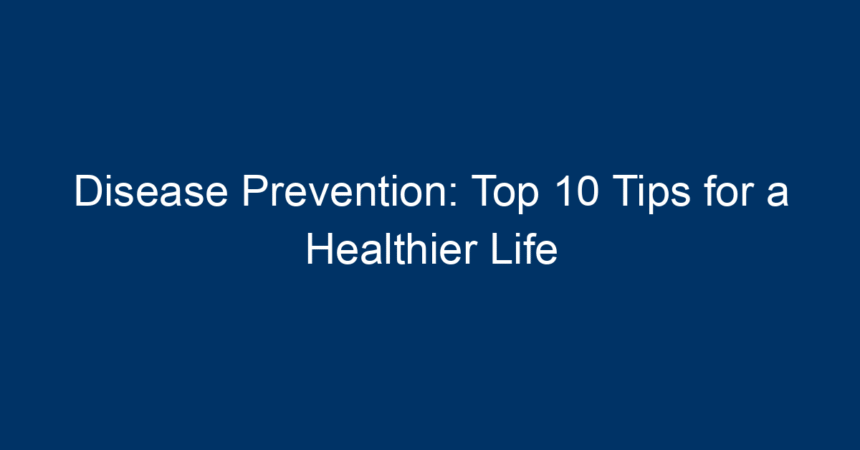In today’s fast-paced world, ensuring optimal health can often take a backseat. However, disease prevention is essential for a long and fulfilling life. By adopting key lifestyle changes, not only can you reduce your risk of chronic diseases, but you can also enhance your overall well-being. This article will delve into the top 10 tips for effective disease prevention, providing actionable insights for transforming your health.
Understanding Disease Prevention
Disease prevention is the practice of taking proactive steps to avoid illnesses and health complications. It encompasses lifestyle habits, regular health screenings, vaccinations, and more. By understanding the importance of disease prevention, individuals can cultivate a healthier life and significantly reduce the chances of encountering serious health issues.
1. Maintain a Balanced Diet
A well-rounded diet is fundamental for disease prevention. Consuming a variety of fruits, vegetables, whole grains, lean proteins, and healthy fats helps nourish your body and fight off diseases.
- Fruits and Vegetables: Aim for at least five servings a day. High in essential vitamins, minerals, and antioxidants, they improve immune function and reduce inflammation.
- Whole Grains: Switch to whole grains like quinoa, brown rice, and oats. These provide fiber, which aids digestion and promotes heart health.
- Healthy Fats: Incorporate sources of unsaturated fats, such as avocados, nuts, and olive oil, which can help lower bad cholesterol.
Incorporating these foods into your meals can go a long way in promoting long-term health.
2. Stay Physically Active
Regular physical activity is crucial for disease prevention. Engaging in at least 150 minutes of moderate-intensity exercise per week can significantly improve cardiovascular health, enhance mood, and support weight management.
- Aerobic Activities: Brisk walking, running, swimming, or cycling can help maintain heart health and improve lung capacity.
- Strength Training: Incorporating resistance exercises at least twice a week can enhance muscular strength, which supports metabolic health and prevents obesity.
Finding an activity you enjoy can make exercising a pleasurable routine rather than a chore.
3. Get Regular Health Screenings
Routine health check-ups and screenings are vital for early detection and disease prevention. Many chronic illnesses, such as diabetes and hypertension, can develop with little to no symptoms. Regular screenings can help identify these conditions before they become severe.
- Blood Pressure Check: Regular monitoring can prevent heart disease and stroke.
- Cholesterol Levels: Knowing your cholesterol levels helps reduce the risk of cardiovascular diseases.
- Cancer Screenings: Pap smears, mammograms, and colonoscopies are crucial for early cancer detection.
Speak with your healthcare provider about what screenings are appropriate for your age and health status.
4. Prioritize Mental Health
Mental health is just as important as physical health in disease prevention. Chronic stress and mental health issues can lead to various physical health problems, including high blood pressure and weakened immune response.
- Stress Management: Techniques such as meditation, yoga, and deep breathing exercises can enhance mental resilience.
- Seek Support: Building a robust social support network and seeking professional help when needed can significantly improve mental well-being.
Caring for your mental health can bolster your overall health and productivity.
5. Avoid Tobacco and Limit Alcohol
Avoiding tobacco in all its forms is a cornerstone of disease prevention. Smoking is linked to numerous health issues, including lung cancer, heart disease, and chronic obstructive pulmonary disease (COPD).
- Quit Smoking: If you smoke, seek help to quit. Resources include counseling, support groups, and nicotine replacement therapies.
- Alcohol Consumption: Limit alcohol intake to moderate levels. This means up to one drink per day for women and two drinks per day for men. Excessive alcohol consumption increases the risk of various diseases, including liver disease and certain cancers.
Making these changes can drastically improve your health outlook.
6. Ensure Adequate Sleep
Sleep plays a critical role in disease prevention. Quality sleep helps the body recover, strengthens the immune system, and improves brain function.
- Sleep Hygiene: Aim for 7-9 hours of sleep each night. Maintain a consistent sleep schedule, create a restful environment, and avoid screens before bed.
- Nap Wisely: Short naps can boost alertness but avoid long or late naps that may disrupt nighttime sleep.
Prioritizing sleep can enhance overall health and well-being.
7. Stay Hydrated
Staying hydrated is essential for maintaining bodily functions and promoting overall health. Water is involved in various physiological processes, including nutrient transport and temperature regulation.
- Water Intake: Aim for at least 8 cups (64 ounces) of water per day, adjusting based on activity levels and climate.
- Limit Sugary Drinks: Avoid sugary sodas and energy drinks, which can contribute to obesity and other health issues.
Making hydration a priority is a simple yet effective way to support disease prevention.
8. Practice Good Hygiene
Good hygiene practices are crucial in preventing the spread of infections and diseases. Simple habits can lead to significant health benefits.
- Hand Washing: Wash your hands regularly, especially before meals and after using the restroom. Use soap and water for at least 20 seconds.
- Vaccinations: Stay up to date with vaccinations to protect against preventable diseases such as flu, measles, and COVID-19.
Incorporating hygiene practices into your daily routine is essential for individual and community health.
9. Foster Strong Relationships
Building meaningful relationships can significantly influence health and longevity. Social connections can help reduce stress, enhance mood, and even lead to longer life expectancy.
- Socialize Regularly: Make time for family and friends, engage in community activities, or join clubs that align with your interests.
- Communication: Openly communicate your thoughts and feelings. A support system can help you navigate life’s challenges more effectively.
Investing in your relationships can lead to a happier, healthier life.
10. Educate Yourself on Health
Knowledge is power. Stay informed about health-related topics, such as disease prevention strategies, nutrition, and mental well-being.
- Speak with Professionals: Don’t hesitate to ask your doctor or a dietitian about concerns or inquire about the benefits of certain lifestyle changes.
- Online Resources: Follow reputable health organizations, read books, or participate in workshops to enhance your understanding of health issues.
Being educated empowers you to make informed health decisions, contributing to effective disease prevention.
Conclusion
Implementing these 10 tips can significantly enhance your quality of life and reduce the risk of diseases. Disease prevention starts with individual choices, and it’s essential to make conscious decisions about your health daily. By prioritizing a balanced diet, regular exercise, mental well-being, and routine health check-ups, you’re already on the path toward a healthier life.
Take action today—start small and gradually incorporate these tips into your life. Your body and mind will thank you, leading to a vibrant, disease-free future. Engage with your healthcare provider to create a personalized disease prevention plan that suits your lifestyle. Remember, the journey to a healthier life begins with a single step.




